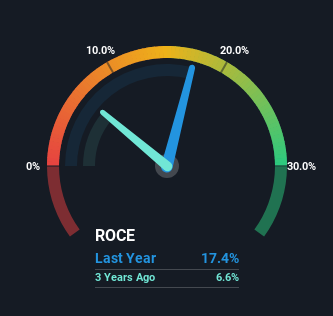- New Zealand
- /
- Food
- /
- NZSE:NZK
New Zealand King Salmon Investments (NZSE:NZK) Shareholders Will Want The ROCE Trajectory To Continue

Did you know there are some financial metrics that can provide clues of a potential multi-bagger? One common approach is to try and find a company with returns on capital employed (ROCE) that are increasing, in conjunction with a growing amount of capital employed. Basically this means that a company has profitable initiatives that it can continue to reinvest in, which is a trait of a compounding machine. Speaking of which, we noticed some great changes in New Zealand King Salmon Investments' (NZSE:NZK) returns on capital, so let's have a look.
What Is Return On Capital Employed (ROCE)?
For those who don't know, ROCE is a measure of a company's yearly pre-tax profit (its return), relative to the capital employed in the business. The formula for this calculation on New Zealand King Salmon Investments is:
Return on Capital Employed = Earnings Before Interest and Tax (EBIT) ÷ (Total Assets - Current Liabilities)
0.17 = NZ$32m ÷ (NZ$208m - NZ$23m) (Based on the trailing twelve months to July 2023).
Thus, New Zealand King Salmon Investments has an ROCE of 17%. That's a relatively normal return on capital, and it's around the 16% generated by the Food industry.
See our latest analysis for New Zealand King Salmon Investments

Above you can see how the current ROCE for New Zealand King Salmon Investments compares to its prior returns on capital, but there's only so much you can tell from the past. If you'd like to see what analysts are forecasting going forward, you should check out our free report for New Zealand King Salmon Investments.
So How Is New Zealand King Salmon Investments' ROCE Trending?
New Zealand King Salmon Investments is showing promise given that its ROCE is trending up and to the right. The figures show that over the last five years, ROCE has grown 56% whilst employing roughly the same amount of capital. Basically the business is generating higher returns from the same amount of capital and that is proof that there are improvements in the company's efficiencies. The company is doing well in that sense, and it's worth investigating what the management team has planned for long term growth prospects.
In Conclusion...
In summary, we're delighted to see that New Zealand King Salmon Investments has been able to increase efficiencies and earn higher rates of return on the same amount of capital. Although the company may be facing some issues elsewhere since the stock has plunged 77% in the last five years. In any case, we believe the economic trends of this company are positive and looking into the stock further could prove rewarding.
New Zealand King Salmon Investments does come with some risks though, we found 2 warning signs in our investment analysis, and 1 of those makes us a bit uncomfortable...
For those who like to invest in solid companies, check out this free list of companies with solid balance sheets and high returns on equity.
If you're looking to trade New Zealand King Salmon Investments, open an account with the lowest-cost platform trusted by professionals, Interactive Brokers.
With clients in over 200 countries and territories, and access to 160 markets, IBKR lets you trade stocks, options, futures, forex, bonds and funds from a single integrated account.
Enjoy no hidden fees, no account minimums, and FX conversion rates as low as 0.03%, far better than what most brokers offer.
Sponsored ContentValuation is complex, but we're here to simplify it.
Discover if New Zealand King Salmon Investments might be undervalued or overvalued with our detailed analysis, featuring fair value estimates, potential risks, dividends, insider trades, and its financial condition.
Access Free AnalysisHave feedback on this article? Concerned about the content? Get in touch with us directly. Alternatively, email editorial-team (at) simplywallst.com.
This article by Simply Wall St is general in nature. We provide commentary based on historical data and analyst forecasts only using an unbiased methodology and our articles are not intended to be financial advice. It does not constitute a recommendation to buy or sell any stock, and does not take account of your objectives, or your financial situation. We aim to bring you long-term focused analysis driven by fundamental data. Note that our analysis may not factor in the latest price-sensitive company announcements or qualitative material. Simply Wall St has no position in any stocks mentioned.
About NZSE:NZK
New Zealand King Salmon Investments
Engages in the farming, processing, and sale of salmon products in New Zealand, North America, Australia, Japan, Europe, and internationally.
Flawless balance sheet and undervalued.


